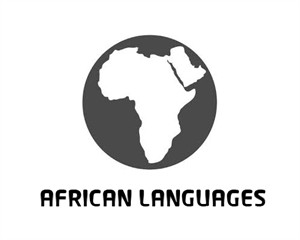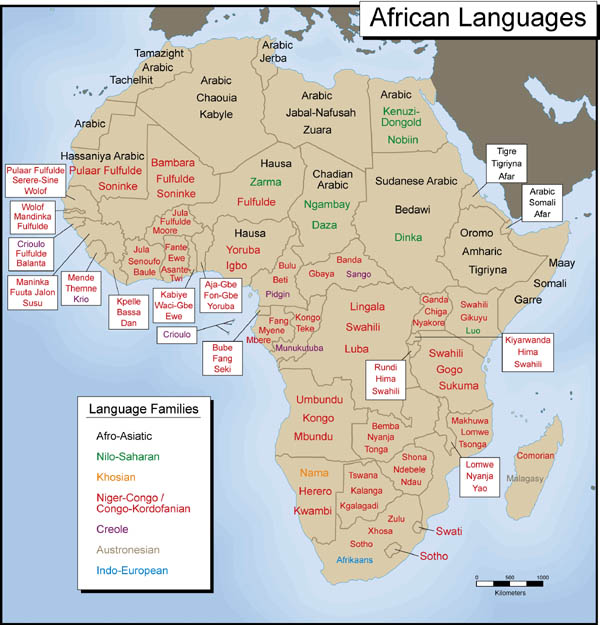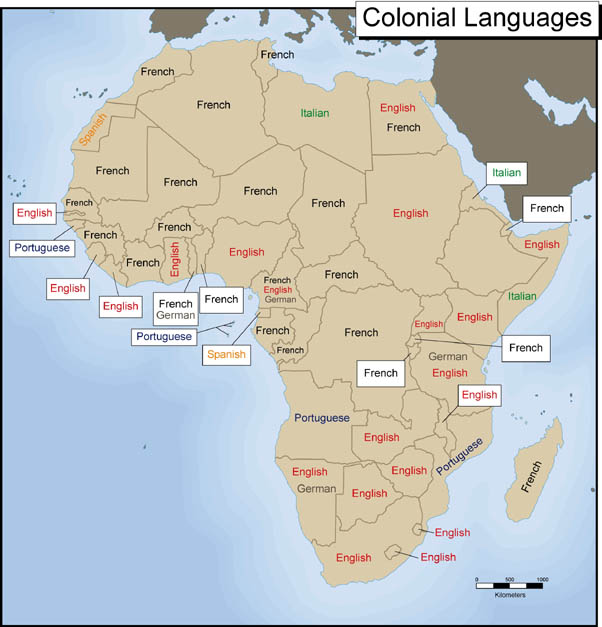African Languages and Locales: Essential Facts
According to a research from McKinsey & Company, Africa’s future looks bright. Some predictions include:
- 50% of Africans will be living in cities by 2030
- 128 million households will have discretionary income in 2020
- 1.1 billion Africans will be of working age by 2040
- Africa’s consumer spending will be $1.4 trillion by 2020
- Africa’s GDP will be $2.6 trillion by 2020

(Source: Lions on the move: The progress and potential of African economies)
Fast Facts on African Languages and Locales
- Africa is a continent not a country 🙂
- There are 56 countries (recognized and defacto states) in Africa
- Six of the ten fastest-growing countries in the world are in Africa
- There are an estimated 2000+ African languages
- There are 4 primary language families in Africa (some classify up to 7 families)
Approximate number of languages and speakers
- Afro-Asiatic – 200 languages covering Northern Africa
- Nilo-Saharian – 140 languages with 11 million speakers throughout Central and Eastern Africa
- Niger-Saharian (Niger-Congo A & B) – 1000 languages with some 200 million speakers
- Khoisan – 30 languages in the western part of Southern Africa

Note: Language families are groups of languages with a common origin and common traits such as syntax, morphology and phonology. It is believed that as people speaking a common language migrated away from each other, languages evolved with each dispersed group. Over time each separate group developed its own new language.
Resource:https://exploringafrica.matrix.msu.edu/students/curriculum/m8/map1.php.

Note: As most of you know Africa’s history is sadly made up of a collection of colonizations. There were several languages introduced to Africa through colonization. This resulted in some European languages, or colonial languages, becoming the official language(s) in most African countries. Today, the majority of Africans speak indigenous African languages as a first language and colonial languages as a second or third language.
Resource: https://exploringafrica.matrix.msu.edu/students/curriculum/m8/map2.php.
National, Official and Trade Languages in Africa
The complex landscape of African languages has evolved and continues to evolve as languages die, become national languages and / or rise to a trade language status due to widespread usage. Companies wishing to expand into an African market should be careful to utilize the most culturally suitable languages based on the country, region, products and services you are offering AND to whom you are targeting, whether B2B or B2C.
| Country | National Languages | Other languages used in country (not all) |
| Algeria | Arabic and four Berber languages | French |
| Angola | Portuguese | Umbundu and other African languages |
| Benin | French | Fon and Yoruba among others |
| Botswana | Setswana | English |
| Burkina Faso | French | African languages part of Sudanic family |
| Burundi | Kirundi, French | Swahili |
| Cameroon | English, French | Over 20 other African languages |
| Cape Verde | Portuguese | Crioulo – mix of Portuguese and West African |
| Central African Republic | French, Sangho | Banda and Gbaya among other African languages |
| Chad | French, Arabic | Sara and more than 120 different languages and dialects |
| Comoros | Arabic, French | Shikomoro – a mix of Swahili and Arabic |
| Democratic Republic of Congo | French | Lingala, Kingwana, Kikongo, Tshiluba |
| Congo | French | Lingala, Monokutuba, Kikongo and many African languages and dialects |
| Côte d’Ivoire | French | Dioula and many African languages and dialects |
| Djibouti | French, Arabic | Afar and Somali |
| Egypt | Arabic | English and French |
| Equatorial Guinea | French, Spanish | Fang, Bubi, Ibo and Pidgin English |
| Eritrea | Arabic, English, Tigrinya | Afar, Bedawi, Kunama, Tigré and other African languages |
| Ethiopia | Amharic | English, Tigrinya, Oromo, Gurage, Somali, Arabic and many other African languages |
| Gabon | French | Bapounou/Eschira, Bandjabi, Fang, Myene, Nzebi |
| Gambia | English | Fula, Mandinka, Wolof |
| Ghana | English | Akan, Adangme, Ewe, Ga, Moshi-Dagomba |
| Guinea | French | Soussou, Peulh, Fulani, Maninka, Kissi, Toma, Guerze and many other African languages |
| Guinea-Bissau | Portuguese | Crioulo and other African languages |
| Kenya | English, Kiswahili | Many African languages |
| Lesotho | Sesotho, English | Zulu, Xhosa |
| Liberia | English | Many African languages |
| Libya | Arabic | English, Italian |
| Madagascar | French, Malagasy | |
| Malawi | English, Nyanja | Lomwe, Tumbuka, Yao, other African languages |
| Mali | French | Arabic, Bambara, Dogoso, Fulfulde, Koyracini, Senoufou, and Mandinka, Tamasheq |
| Mauritania | Arabic | French, Hassaniya Arabic, Pulaar, Soninke |
| Mauritius | English, French | Creole, Hindi, Urdu, Hakka, Bhojpuri |
| Morocco | Arabic | French |
| Mozambique | Portuguese | Lomwe, Makhuwa, Sena, Tsonga and other African languages |
| Nambia | English | Afrikaans, Herero, Nama, Oshivambo |
| Niger | French | Djerma, Hausa |
| Nigeria | English | Fulani, Hausa, Ijaw, Ibibio, Igbo, Yoruba and many other African languages |
| Réunion | French | Creole |
| Rwanda | Rwanda (Kinyarwanda, Bantu vernacular) French, English | Kiswahili (Swahili) |
| Saint Helena | English | |
| São Tomé and Príncipe | Portuguese | |
| Senegal | French | Jola, Mandinka, Pulaar Wolof |
| Seychelles | English, French | Creole |
| Sierra Leone | English | Mende, Krio, Temne |
| Somalia | Somali | Arabic, English, Italian |
| South Africa | 11 official languages including Afrikaans, English, isiNdebele, Pedi, Sesotho (Sotho), siSwati (Swazi), Xitsonga (Tsonga), Tswana, Tshivenda (Venda), isiXhosa, isiZulu | |
| Sudan- South Sudan | Arabic | English, Nubian, Ta Bedawie |
| Swaziland | English | |
| Tanzania | Kiswahili (Swahili) and English | Arabic, Gogo, Haya, Makonde, Nyakyusa, Nyamwezi, Sukuma, Tumbuka and many African languages |
| Togo | French | Dagomba, Ewe, Kabye |
| Tunisia | Arabic | French |
| Uganda | English | Arabic, Ganda, Swahili |
| Western Sahara | Arabic – Moroccan and Hassaniya | |
| Zambia | English | Bemba, Kaonda, Lozi, Lunda, Luvale, Nyanja, Tonga, and many other African languages |
| Zimbabwe | English | Chewa, Chishona, Nambya, Nyanja, Shangani, Sindebele, Sotho, Tongo, Venda |
Sources: Ethnologue, ISO Country Names (ISO 3166-1), ISO Languages Names (ISO 639-1), African Academy of Languages (ACALAN) and others.
